State of the Industry: The Impact of Pet Insurance on U.S. Veterinary Practices in 2025
Scroll to view report ↓
State of the Industry: The Impact of Pet Insurance on U.S. Veterinary Practices in 2025
Scroll to view report ↓
Abstract
As veterinary practices across the United States strive to provide comprehensive and high-quality care, there is a growing recognition of the impact of pet insurance on patient outcomes, client satisfaction, and clinic/hospital growth. Pawlicy Advisor’s State of the Industry data is compiled by Pawlicy Advisor and the American Animal Hospital Association (AAHA) from a survey of 557 veterinary professionals.
Each year, Pawlicy Advisor and AAHA work together to conduct an industry-wide survey and gather key information about the real impact of pet insurance across U.S. veterinary practices. This data is then aggregated and analyzed to produce a set of established benchmarks and statistics which are incorporated into Pawlicy Advisor’s State of the Industry Report.
Table of Contents
Introduction
Pawlicy Advisor is pleased to present Pawlicy Advisor’s State of the Industry Report: The Impact of Pet Insurance on U.S. Veterinary Practices in 2025.
Pawlicy Advisor’s State of the Industry data represents feedback from 557 veterinary professionals across the U.S.
The objective of this report is to provide a better understanding of the real impact of pet insurance within the veterinary practice.
DISCLAIMER: Pawlicy Advisor and the American Animal Hospital Association assume no liability of any kind regarding the information contained in the State of the Industry Report. The information in this report does not constitute investment, legal, accounting, or tax advice.
Methodology
Pawlicy Advisor conducted a comprehensive survey in conjunction with the American Animal Hospital Association (AAHA) to study the impact of pet insurance within veterinary practices. The survey ran from February 2025 until March 2025, and comprised data from a total of 557 respondents across a variety of roles and practices.
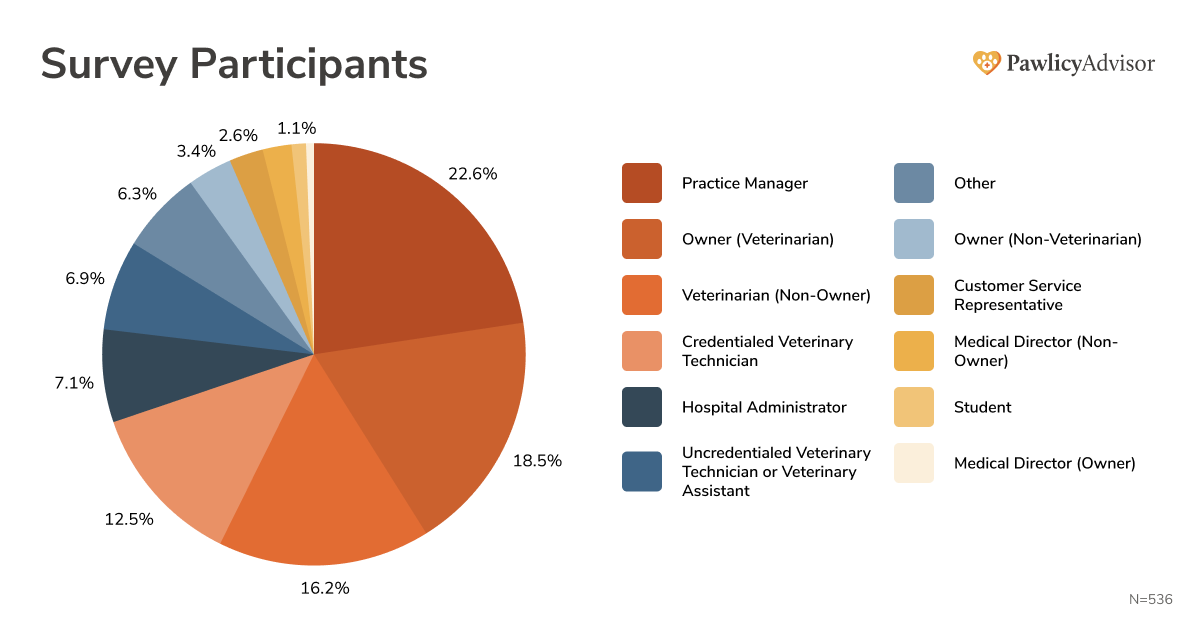
The survey questions focused on understanding the financial conversations that are being had with clients, the impact of pet insurance, and the conversations that are being had about pet insurance with clients.
Financial Conversations With Clients
1. Frequency of Difficult Financial Conversations with Clients
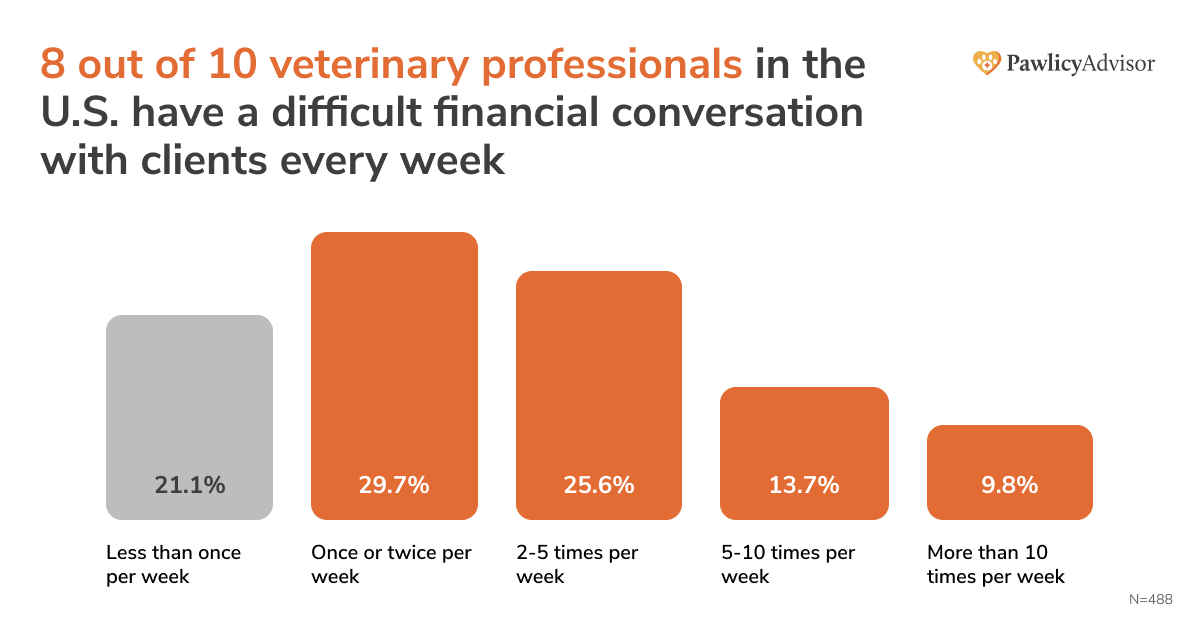
- 8 out of 10 veterinary professionals in the U.S. have a difficult financial conversation with clients every week.
- Nearly a quarter (23.5%) of U.S. veterinary professionals have difficult financial conversations with clients 5 to 10 times per week or more.
- On average, U.S. veterinary professionals have a difficult financial conversation with clients 4 times per week.
2. Frequency of Adjusting Recommended Treatment Plans Due to Cost Concerns
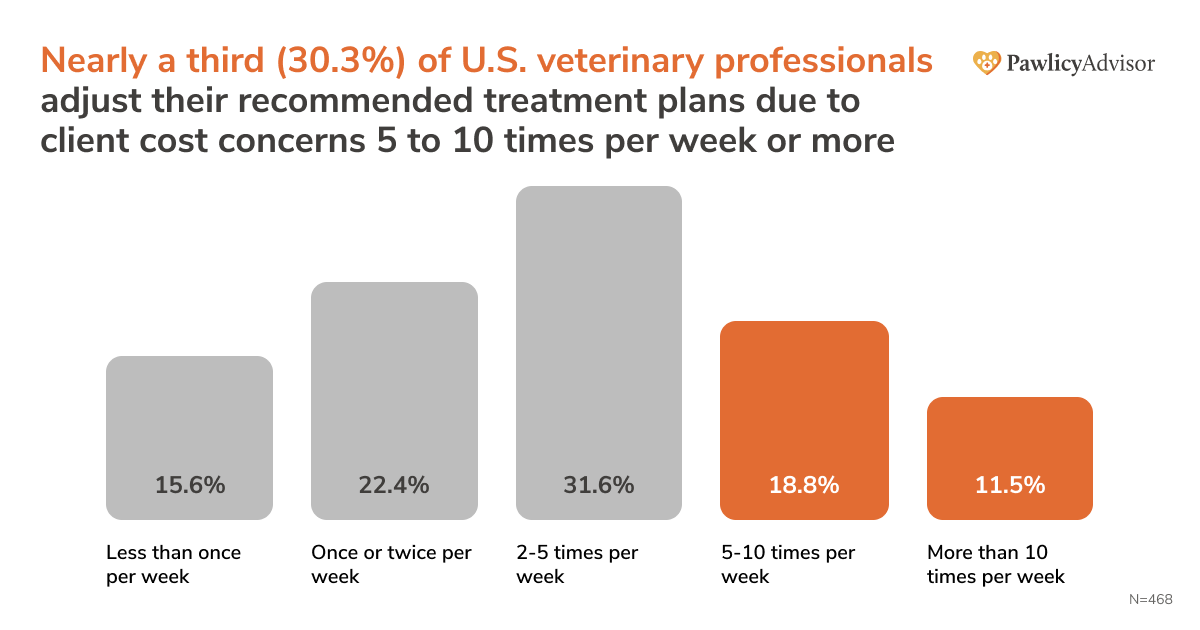
- 84.4% of U.S. veterinary professionals adjust their recommended treatment plans on a weekly basis due to cost concerns from clients.
- Nearly a third (30.3%) of U.S. veterinary professionals adjust their recommended treatment plans due to client cost concerns 5 to 10 times per week or more.
- On average, U.S. veterinary professionals adjust their recommended treatment plans due to client cost concerns 4.7 times per week.
Nearly every day, veterinary teams are making adjustments to their treatment recommendations and having difficult financial conversations because of cost.
3. Percent of Euthanasia Decisions Due to Inability to Afford Treatment
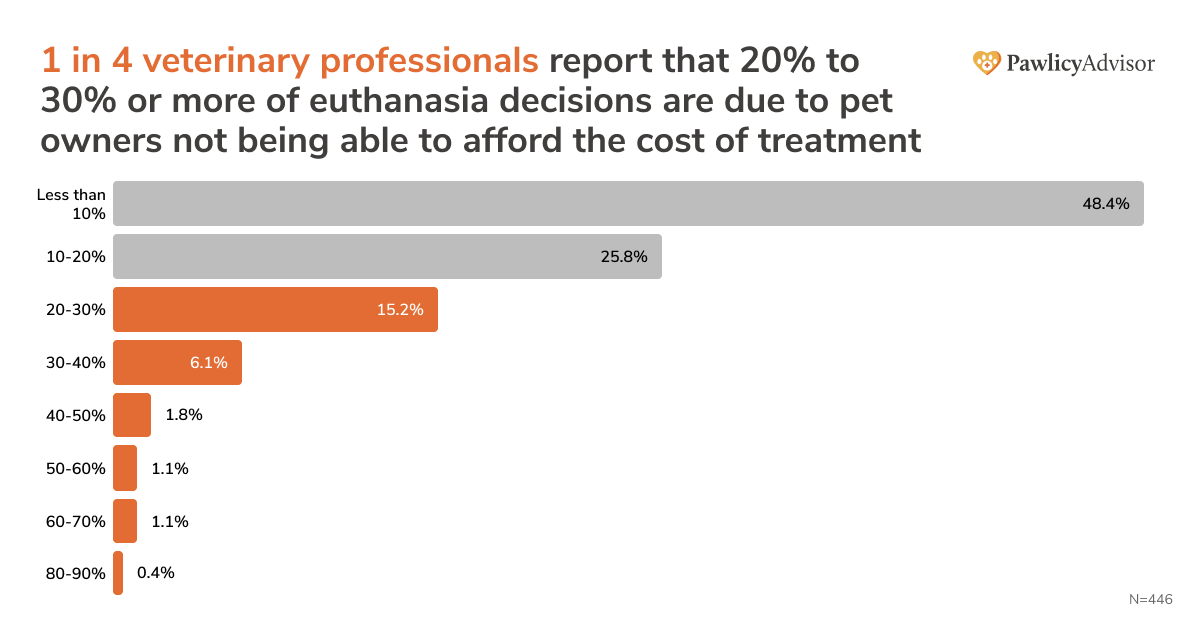
- 1 in 4 veterinary professionals report that 20% to 30% or more of euthanasia decisions are due to pet owners not being able to afford the cost of treatment
Impact of Pet Insurance
1. Percent of Pets Insured Within the Practice
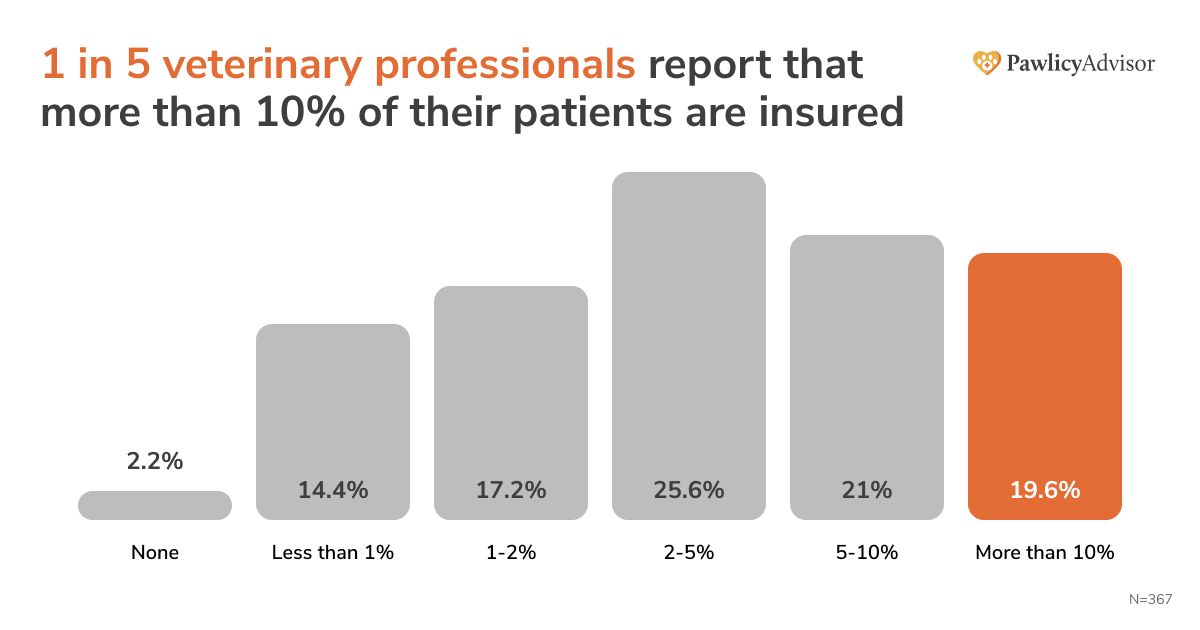
- 1 in 5 veterinary professionals report that more than 10% of their patients are insured.
- 40% of veterinary professionals report a percentage of insured patients above the national average.
- 97.8% of veterinary professionals report that a non-zero percentage of their patient base is insured.
Statistically Significant Finding: A cross-analysis of this data uncovered that, statistically, practices with a higher percentage of insured pets are (1) less likely to need to adjust treatment plans due to the cost of the recommended plan, and (2) less likely to make euthanasia decisions because they cannot afford the cost of treatment.
2. Having the Right Pet Insurance Impacts Client, Patient, and Veterinary Staff Experience
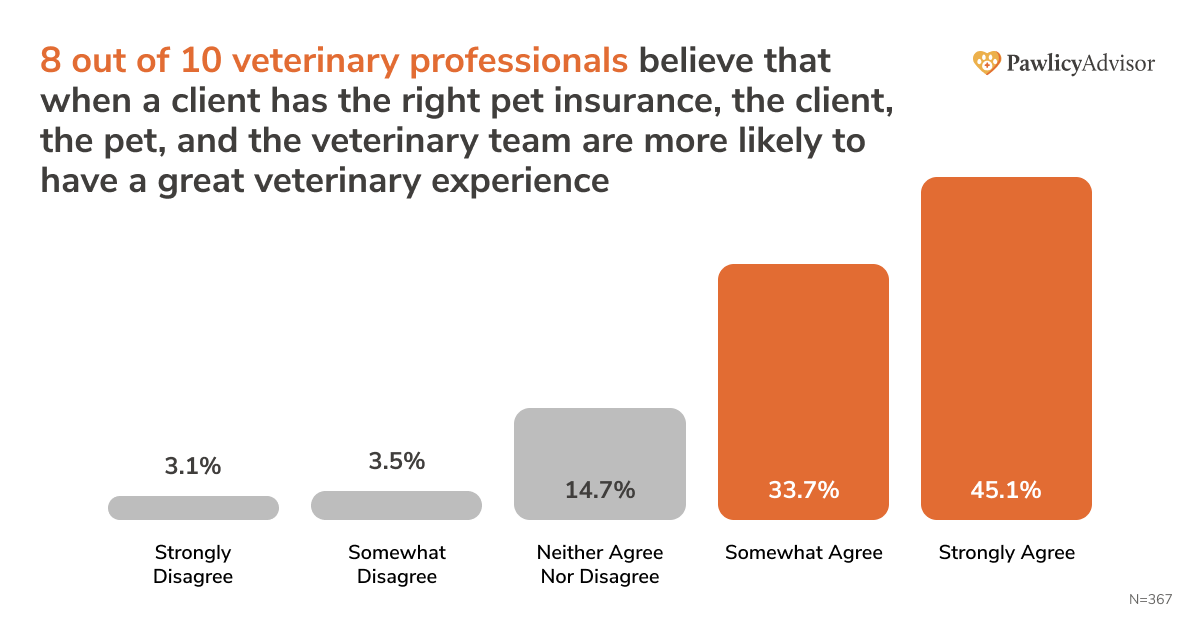
- 8 out of 10 veterinary professionals believe that when a client has the right pet insurance, the client, the pet, and the veterinary team are more likely to have a great veterinary experience.
3. Pet Insurance Impacts Client Ability to Say “Yes” to Care
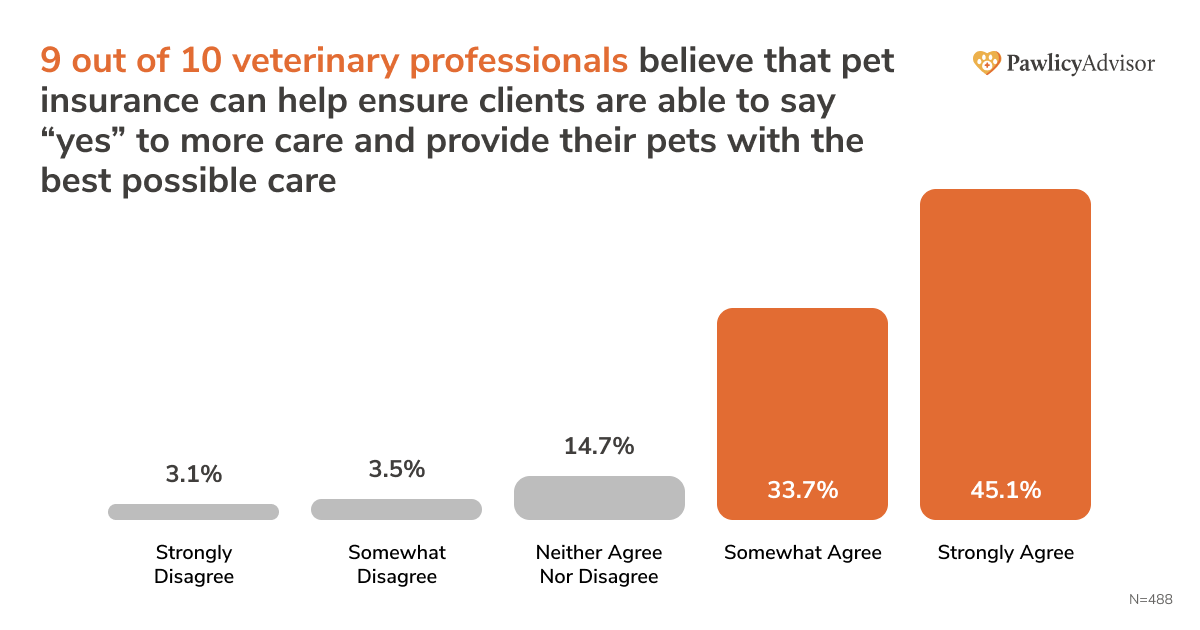
This is the second year in a row that respondents reflect a nearly unanimous agreement on the positive impact that pet insurance has on providing care.
4. Pet Insurance Reduces Anxiety Around Cost of Care
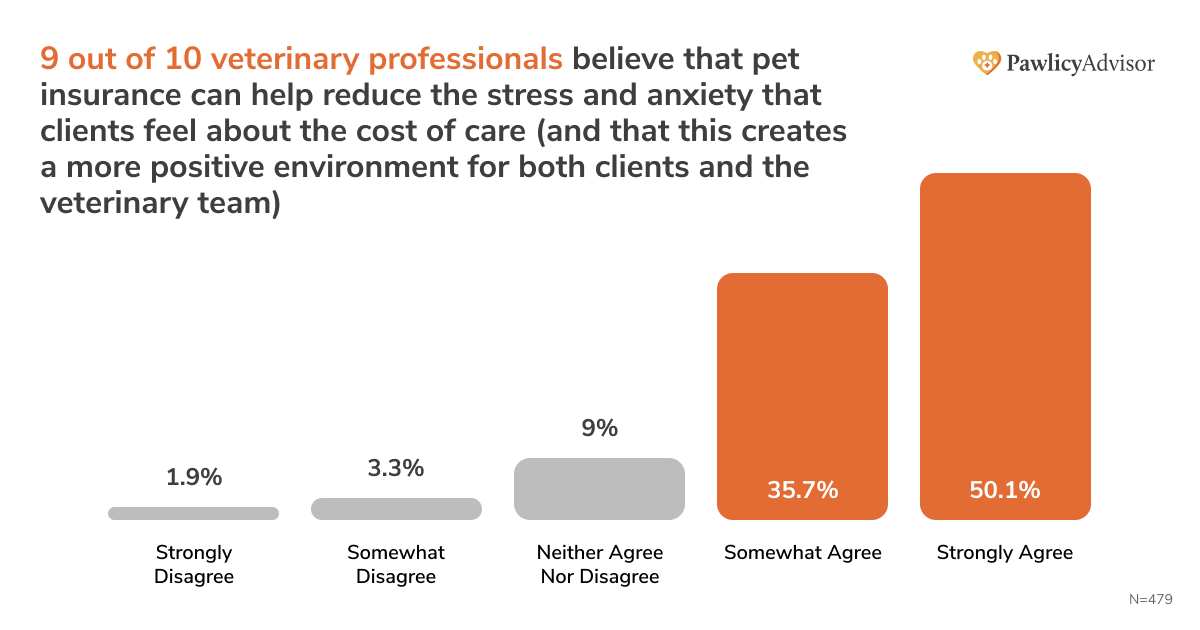
This is the second year in a row that respondents reflect a nearly unanimous agreement on the positive impact that pet insurance has on reducing stress.
5. Great Pet Insurance Experiences Help Clinic Growth
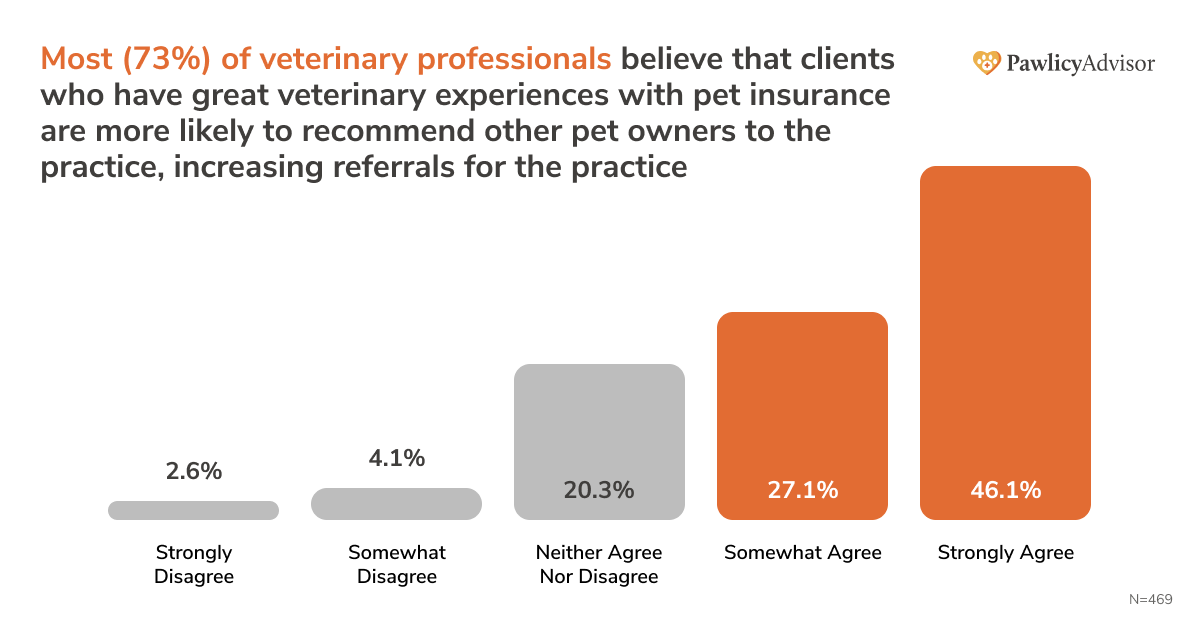
6. Importance of Pet Insurance
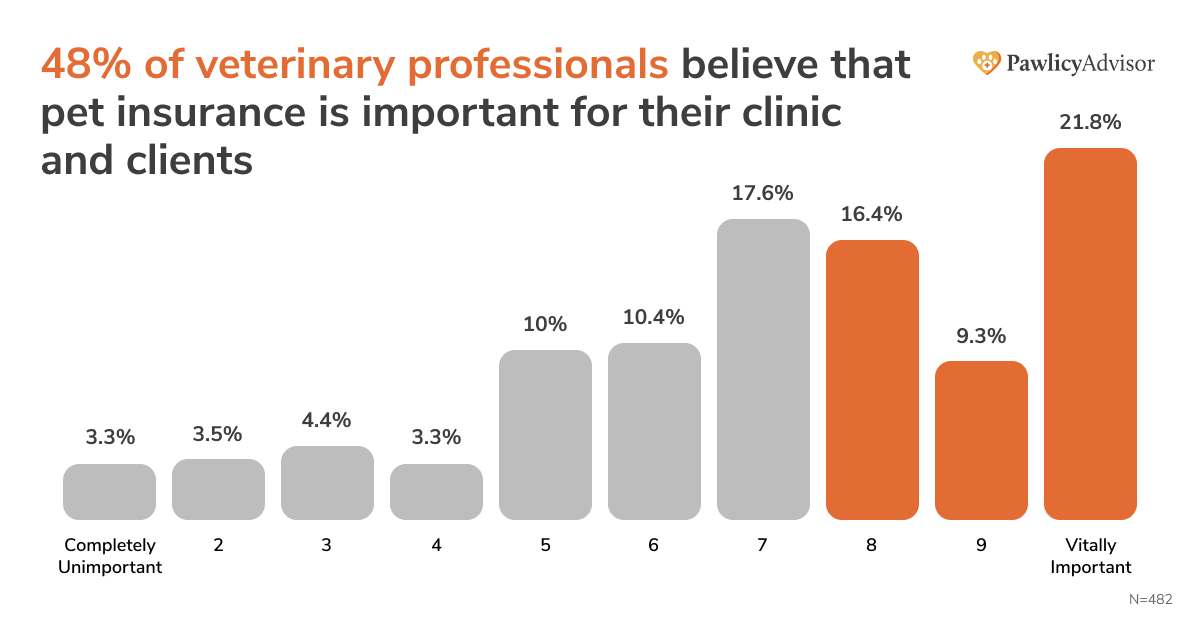
- 48% of veterinary professionals believe that pet insurance is important for their clinic and clients.
- 1 in 5 veterinary professionals believe pet insurance is vitally important – a game changer for their practice and/or makes a real difference in the execution of their business model.
7. The Impact of Pet Insurance as Compared to Treating Uninsured Patients
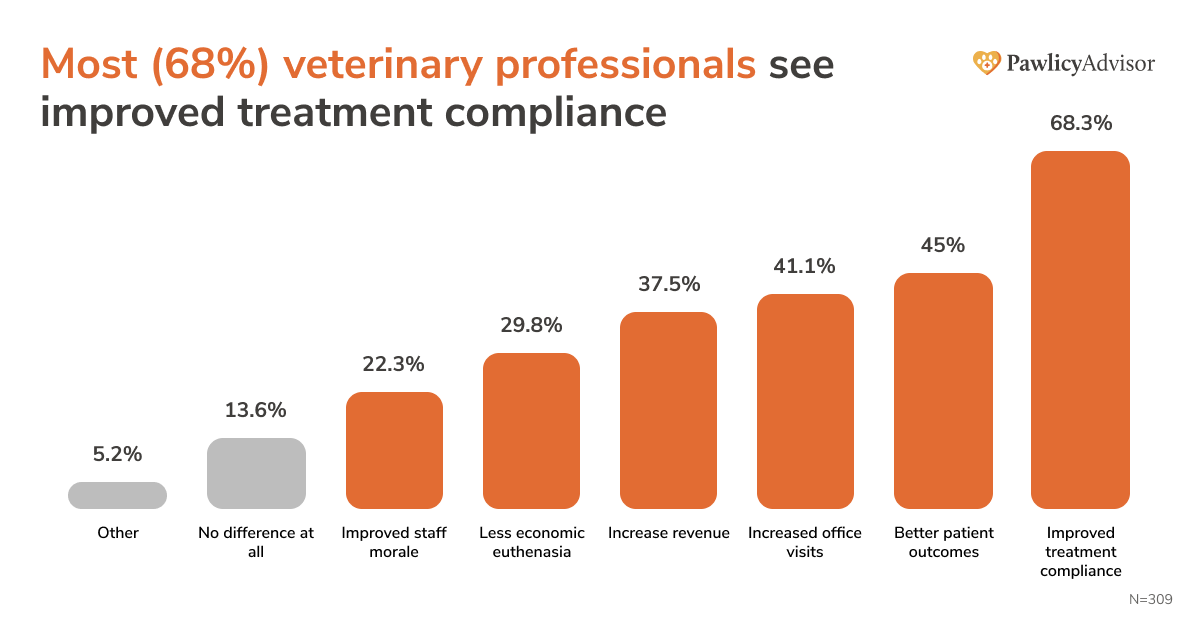
- Most (68%) veterinary professionals see improved treatment compliance
- Nearly half (45%) of veterinary professionals see better patient outcomes
- 1 in 3 (30%) veterinary professionals see less economic euthanasia
9 out of 10 veterinary professionals have observed that pet insurance has a positive impact.
Discussing Pet Insurance With Clients
1. Frequency That Pet Insurance Discussions Are Happening with Clients
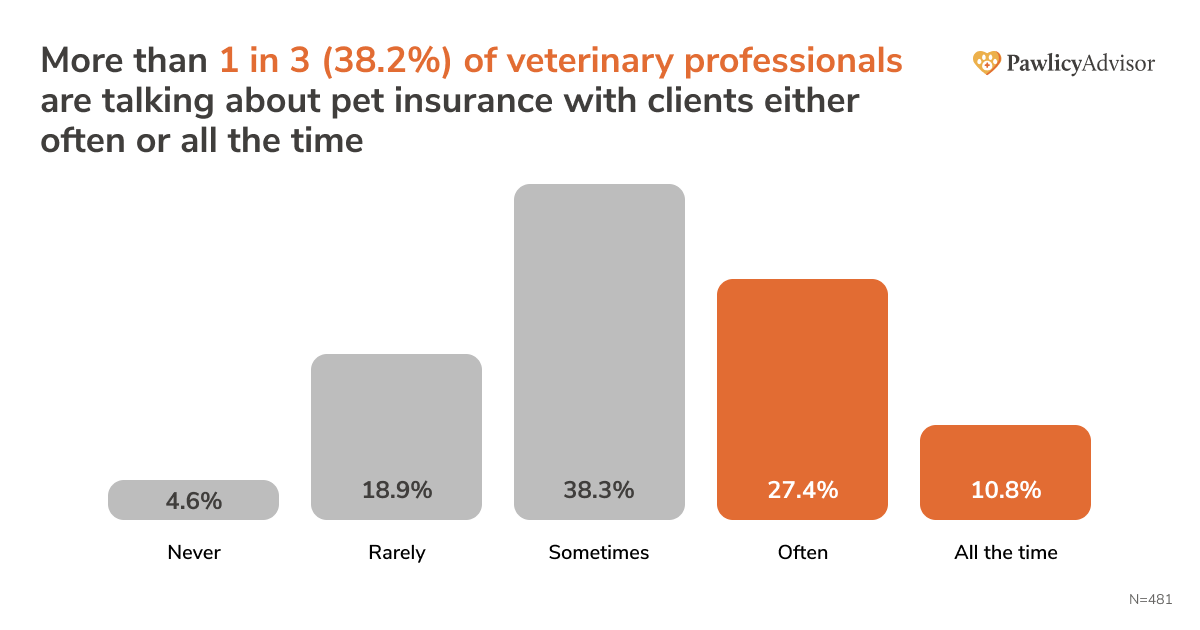
- More than 1 in 3 (38.2%) of veterinary professionals are talking about pet insurance with clients either often or all the time.
While responses about the impact of pet insurance were nearly unanimous in terms of it being a positive force within the practice, there’s a significant opportunity for more discussions about pet insurance with clients.
2. When The Pet Insurance Conversation is Happening
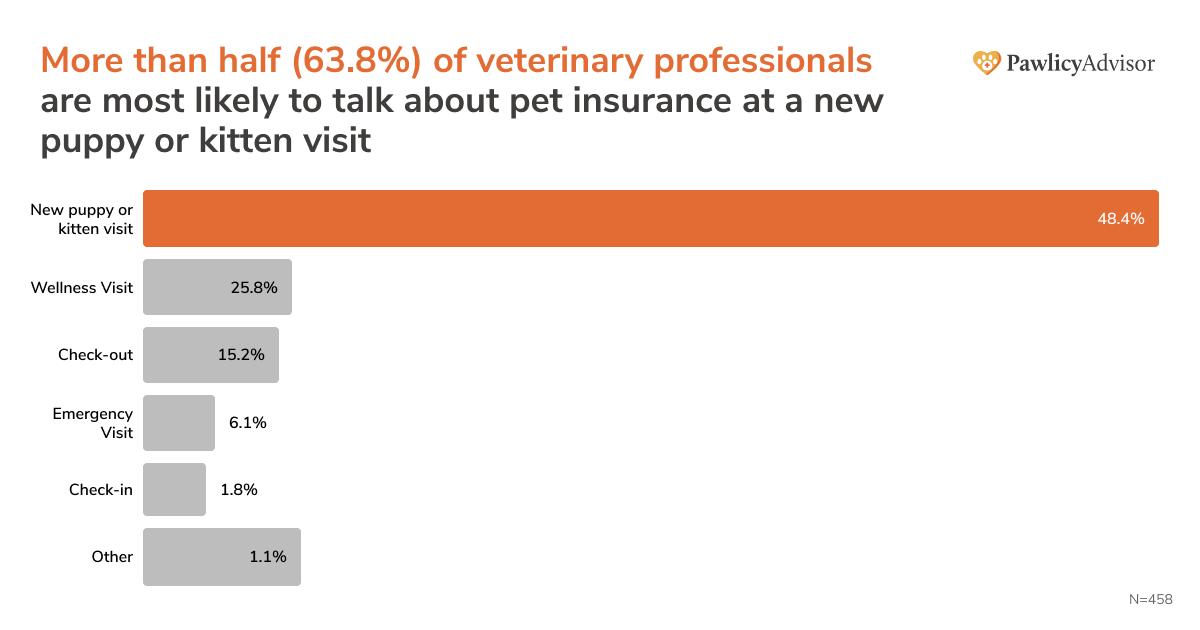
- More than half (63.8%) of veterinary professionals are most likely to talk about pet insurance at a new puppy or kitten visit.
3. Veterinary Team Members That Talk About Pet Insurance With Clients
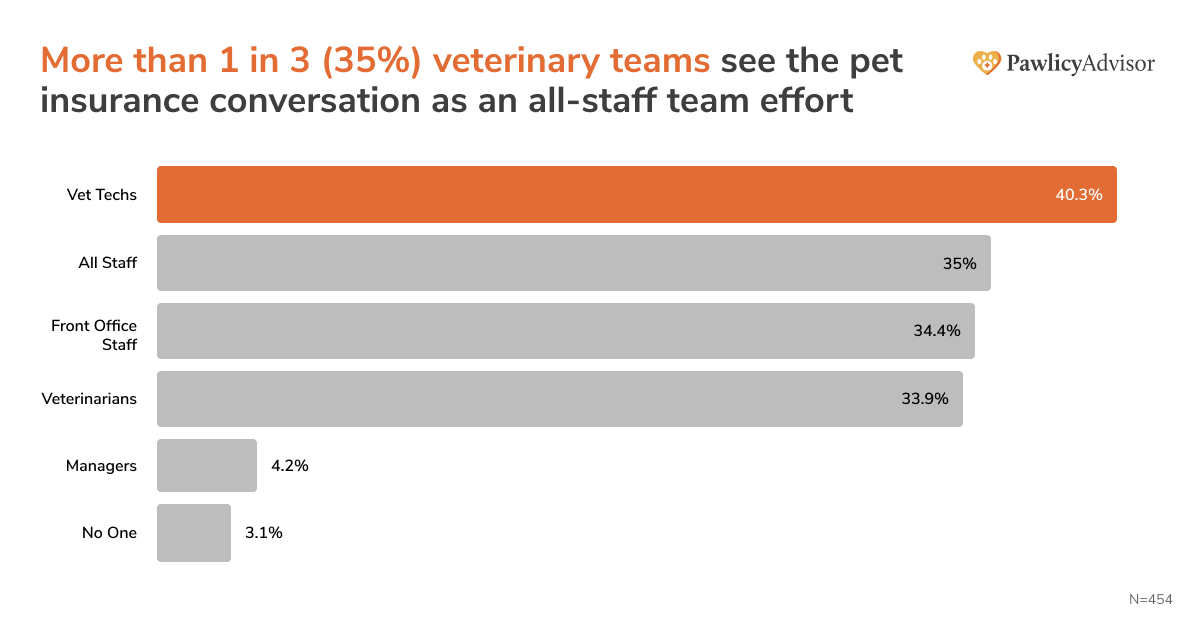
- More than 1 in 3 (35%) veterinary teams see the pet insurance conversation as an all-staff team effort.
- Vet Techs are the most likely team members likely to discuss pet insurance with clients.
4. Navigating the Pet Insurance Conversation With Clients
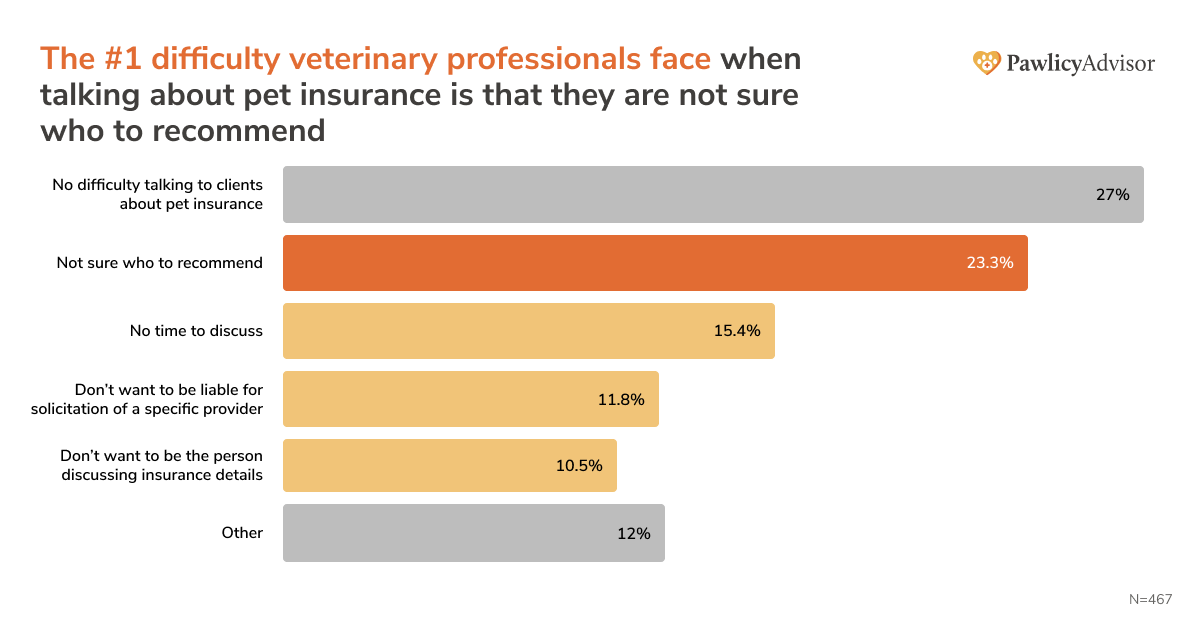
- 73% of veterinary professionals find difficulty in talking to clients about pet insurance.
The #1 difficulty veterinary professionals face when talking about pet insurance is that they are not sure who to recommend.
The #2 difficulty that veterinary professionals face is that they don’t want to be liable for recommending the wrong plan and/or they don’t want to discuss specific details about insurance.
4. Comfort With Liability of Recommending One Specific Insurer
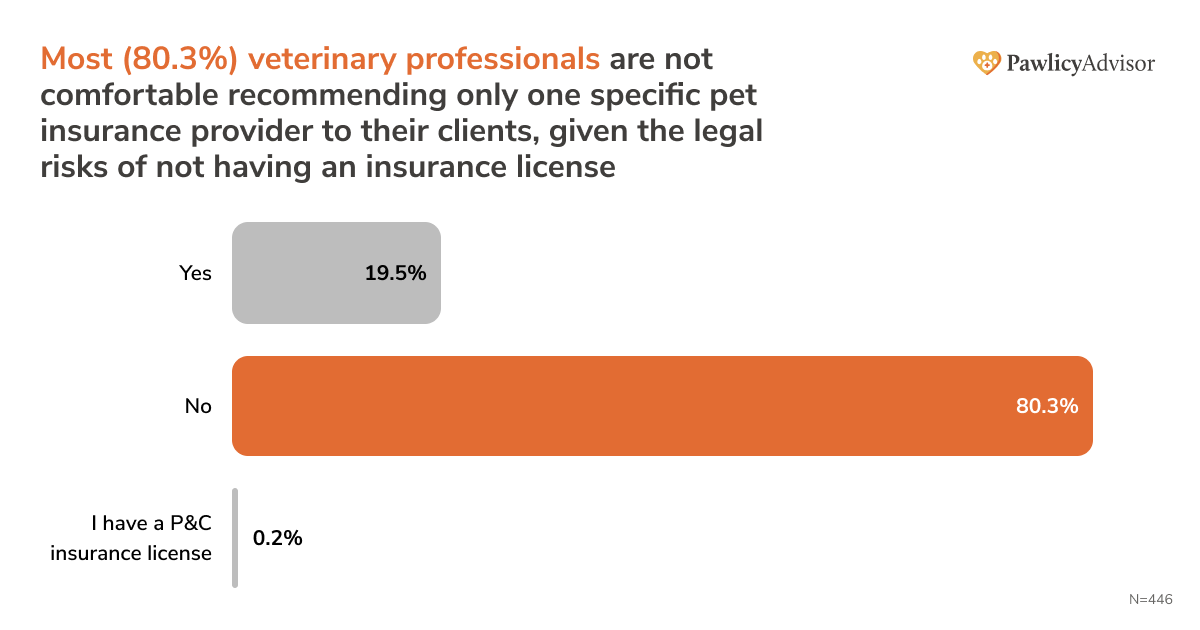
- Most (80.3%) veterinary professionals are not comfortable recommending only one specific pet insurance provider to their clients, given the legal risks of not having an insurance license.
Less than 1% of veterinary professionals have a P&C insurance license, and therefore, legally, should not solicit for specific insurers. Instead, veterinary professionals should refer clients to a licensed brokerage like Pawlicy Advisor.
Conclusions
Pet insurance is no longer a fringe benefit—it is fast becoming a cornerstone of modern veterinary care. Pawlicy Advisor's State of the Industry report's 2025 data uncovers three truths:
1. Financial friction is impacting patient care—and staff morale
- Cost conversations are constant. Clinicians face four difficult money conversations per week, on average, and adjust treatment plans almost as often.
- Economic euthanasia remains far too common. One‑quarter of respondents say 20–30 % + of euthanasia decisions are price‑driven.
Takeaway: Without a buffer, cost keeps dictating medical choices and eroding team well‑being.
2. Insurance changes the practice equation
- Coverage shifts outcomes. Hospitals with larger insured client bases statistically record fewer declined diagnostics or treatments and fewer price‑driven euthanasias.
- 9 in 10 veterinary professionals credit insurance with better treatment compliance, reduced anxiety, and superior patient results.
Takeaway: The right pet insurance empowers pet owners to say “yes” to optimal care—lifting patient health, client satisfaction, and practice revenue simultaneously.
3. The conversation gap is the industry’s biggest untapped lever
- Only 38 % of teams discuss insurance “often or always,” despite near‑unanimous belief in its value.
- Liability fears and product confusion choke dialogue. 8 in 10 veterinary professionals will not recommend one individual pet insurer; fewer than 1 % hold the license required to do so.
Takeaway: Education and a neutral, marketplace referral model removes compliance risk to unlock broader adoption of pet insurance.
Strategic Recommendations
- Track your percentage of insured pets. Track percentage insured the same way you monitor preventive‑care uptake or average transaction value.
- Standardize your conversation at first‑visit touchpoints. Scripts and handouts for pet insurance at puppy/kitten exams capture owners before big bills strike.
- Leverage licensed partners. Refer pet owners to trusted marketplace broker platforms like Pawlicy Advisor to stay within legal bounds while giving clients objective guidance.
- Train the whole team—not just doctors. Empower techs and CSRs to raise the topic; 35 % of practices already treat it as an all‑staff effort.
What can we do for clients who struggle with upfront treatment costs while waiting for their claim reimbursement?
Many practices can also benefit from pairing the pet insurance conversation with other solutions to cover a broader spectrum of your client base. Credit-based solutions, payment plans, and charitable funds pair beautifully with pet insurance, allowing the pet owner to afford the upfront treatment cost while waiting for claim reimbursement.
Pet insurance adoption is still in its early innings—yet its clinical and commercial upside is clear. Practices that move from passive endorsement to proactive integration will not only safeguard patients and clients but also help future‑proof their businesses against rising costs and competitive pressures.
Pawlicy Advisor and AAHA will continue to track these trends; we invite every hospital to participate in next year’s survey and help drive the profession toward better care experiences.
About Pawlicy Advisor
Pawlicy Advisor is the #1 pet insurance marketplace and comparison platform committed to helping pet owners find the right pet insurance for their unique pet and helping veterinary teams deliver better care to more patients. Pawlicy Advisor is recommended by the American Animal Hospital Association and offers a free solution that streamlines client education and discovery of pet insurance products with objective, data-driven recommendations based on the unique information of each individual pet – helping over 1 million pet owners find the best pet insurance for their coverage needs. Visit pawlicy.com/vet to learn more about Pawlicy’s free resources loved by vet teams nationwide.